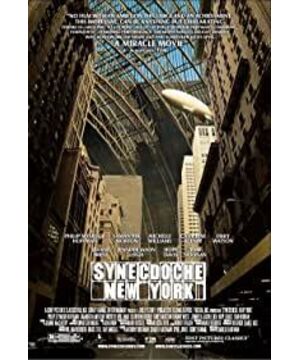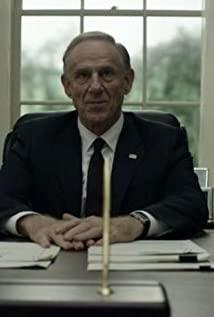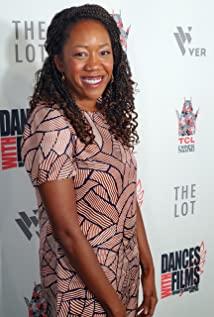of synonymy: a rhetorical technique that expresses things not by name but by the phenomenon of the object itself.
The title of "New York Synonymy" is like a reminder given by the director (screenwriter) Charlie Kaufman. Indeed, the whole movie is a synonym. As the first directed work of a well-known screenwriter, Charlie Kaufman The extremely strong textual magnetic field (grammar, literary logic, poetry, etc.) accumulated by Fuman concentrated on the synonymous usage of the rhetoric of synonymy. This is a unique and highly literary movie, and the enigmatic style that the audience will experience is woven by Kaufman with rigorous and continuous ingenuity.
This movie is Kaufman’s game of alternate rhetoric. Synonyms are referents, everything is referents: drama refers to movies, set refers to cities, and identity exchange refers to self-division and fictional stories. Refers to biography, movie refers to literature, Kayton (story character) refers to Kaufman (director and screenwriter), film title refers to rhetoric, rhetoric refers to drama...
a complex and detailed rhetorical rotation in the movie The middle unfolds like the protagonist's slow pace.
The protagonist, Kayton, is a playwright living in New York. In his middle age, he is at odds with his wife, his career is half-achieved, his body is declining, and his death is shadowed. At 26 minutes and 38 seconds of the movie, after his wife and daughter left Kayton, he completely entered the world of drama he had constructed. There were some absurd scenes as fictional hints before, such as his second lover, Haruer’s master. It is a house shrouded in white smoke produced by an inexplicable flame (smoke is the best catalyst for mystery). Kaufman paved the atmosphere with absurdity. At this point, the white smoke of rhetoric was completely released. The plot that came down was completely shrouded.
Kaufman made the transition between reality and unreality seamless, and only at the end does it become clear to people that they turn around to find that node. After that inadvertent transition, Kayton’s real life disappeared in the story, and the audience slipped into a fictional fog without knowing it (it can be said that this is also a reflection of the invading life of dreams and memories in Fellini’s "Eight and a half" Tribute).
The screenwriter Kayton started the final plan of his life in the studio: directing one of the greatest dramas and screenwriting everything in life. He reproduced an equal proportion of New York in the studio. He kept changing his wives, became old and depressed, and his life was still in constant crisis. At the same time, in the metaphor of New York, he used actors to make a difference. Play all the identities in one's life in a one-to-one correspondence, and this kind of play keeps looping, and even actors begin to play actors. Eventually he exchanged identities with Alan the cleaner, Alan the cleaner became the director Kayton, and the director Kayton became Alan the cleaner.
The headset worn by Kayton as a cleaner guides him how to act, how to live, when to talk, and when to sleep. The headset refers to the supreme voice in all dramas—the author, the film’s in and out of the play. It's all horrible, and Kaufman seems to make us ask ourselves, who is that voice in our real life?
At the end, the old Kayton wanders in the middle of Synopsis New York, surrounded by ruins, rubbish and corpses, all the products of the collapse of the city (the world of drama), and the streets are empty. The voice in the headset tells the truth: what used to be in front of you, an exciting and mysterious future, is now behind you, over and disappointed, you understand that you are not that special anymore, you are You have struggled for survival, but now you can only walk silently. Everyone and every individual has this experience, and everyone’s plot is almost the same, so you are also Adele, Hare, Claire, Oliver, you are also Alan, and all her sorrows are yours. , All the loneliness, hay-like hair, and red hands are also yours. It's time for you to understand these.
Cayton spent his life in the metaphor of New York. What we see is a process of self-completion, which is full of different emotions in life, about death, about gloom and humbleness. In the concept of that theater, the wife settles in In Germany, her daughter grew up. Excessive tattoos caused her to contract a terminal illness. Death occurred one after another. People who were alive had to mourn the chances of being alive at the funeral. The director clearly stated here that he was inciting emotions, but He and the audience are just the screenwriter sitting underneath. The amplification of emotions is part of the drama, and the biggest part is always occupied by death.
Charlie Kaufman flipped the traditional theater conventions a bit, and avoided playing with the old-fashioned stream of consciousness structure, making everything appear to be separated and real, and everything that is false and true has no ultimate truth. On the topic of death and aging, everyone is just a certain character waiting to exit. The vulgar meaning of life is like a play, and Kaufman performed a wonderful and amazing loop interpretation.
A screenwriter, he exists as a construction of life. Who will construct this screenwriter's life? If God exists, it should only exist in rhetoric.
View more about Synecdoche, New York reviews











